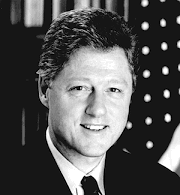Bill Clinton: Whitewater, Paula Jones, and Monica Lewinsky

by Ann-Marie Imbornoni and Tasha Vincent |
 |
Clinton became the 42nd U.S. president following a turbulent political campaign that included vigorous personal attacks on his character. The "character issue" stemmed from allegations of infidelity, which Clinton and his wife Hillary refuted in a television interview, asserting that their relationship was solid. Throughout his term in office, Clinton was also dogged by allegations relating to the failed Whitewater real estate deal, in which he and Hillary had been involved prior to the 1992 election. Though the Clintons were never accused of any wrongdoing, partners in the venture were convicted of fraud and conspiracy in a trial in 1996.
Following his election to a second term in 1996, Clinton came under increasing pressure from Kenneth Starr, the independent counsel who in 1994 took over the investigation of the Clintons' involvement in the Whitewater land deal. Over time, Starr's brief was expanded to include other matters, such as the death of White House lawyer Vincent Foster, the handling of firings in the White House travel office, and shocking allegations of sexual misconduct by Clinton.
In Jan. 1998, Clinton was called to testify in a long-pending sexual harassment suit brought against him by Paula Corbin Jones, a former Arkansas state employee. In his testimony, Clinton denied that he had had a sexual relationship with a young White House intern, Monica Lewinsky, and that he had attempted to cover it up. Although a federal judge in Arkansas threw out the Jones sexual harassment suit in April 1998, the same judge fined Clinton $90,000 in July 1999, after finding him guilty of giving false and misleading testimony in the Jones case over the alleged affair with Lewinsky. Meanwhile, the Lewinsky affair became the focus of Kenneth Starr's investigation as well as a national obsession.
On Aug. 17, 1998, after relentless media attention, leaks, and news of Lewinsky's upcoming testimony, Clinton made history by becoming the first U.S. president to testify in front of a grand jury in an investigation of his own possibly criminal conduct. In an address to the nation that evening, he admitted to having had an "inappropriate relationship" with Lewinsky, but reaffirmed that he did not ask anyone to lie about or cover up the affair.
Paradoxically, in spite of the scandalous outcome of events, Clinton's overall popularity among Americans remained high. For the most part, the country seemed willing to ignore his weaknesses in character, as long as the economy was good, his policies were popular, and the United States remained strong abroad.
On Sept. 9, 1998, Kenneth Starr—a conservative Republican whose investigation was seen by Clinton supporters as a politically inspired vendetta—delivered his report to the House of Representatives. While the report outlined 11 possible grounds for impeachment, none stemmed from the initial subjects of the investigation, including the Whitewater real estate deal. The real focus of the accusations seemed to be Clinton's moral conduct, and the "Starr Report" graphically detailed his sexual affair.
Despite the American population's general disapproval of a trial (which was reflected in poll after poll), Congress moved forward in its highly partisan impeachment proceedings, and on Dec. 19 Clinton became the second president in American history to be impeached. Two of the four articles of impeachment passed (Article I, grand jury perjury, and Article III, obstruction of justice), the votes drawn along party lines. After a Senate trial in Jan.-Feb. 1999, Clinton was acquitted on both counts.
On Jan. 19, 2001, the day before he left office, Clinton reached an agreement with independent counsel Robert Ray, the special prosecutor who had succeeded Kenneth Starr. In exchange for immunity from prosecution on perjury charges after he left office, Clinton admitted giving false testimony about his relationship with Monica Lewinsky, and he agreed to accept a five-year suspension of his Arkansas law license and to pay a fine of $25,000. The deal also satisfied the Arkansas Supreme Court Committee, which had sought to disbar Clinton for giving misleading testimony in the Jones case.
Despite having settled the long-standing legal battle, Clinton continued to stir up controversy. In his final days, he issued some 140 pardons, including one to billionaire fugitive financier Marc Rich. The pardon outraged many Democrats and Republicans alike, and the Justice Department began a criminal investigation to determine if the pardon was related to the $1.5 million donated to the Democratic Party and Clinton's library by Rich's ex-wife, Denise Rich.
See also Encyclopedia: Lewinsky Scandal







